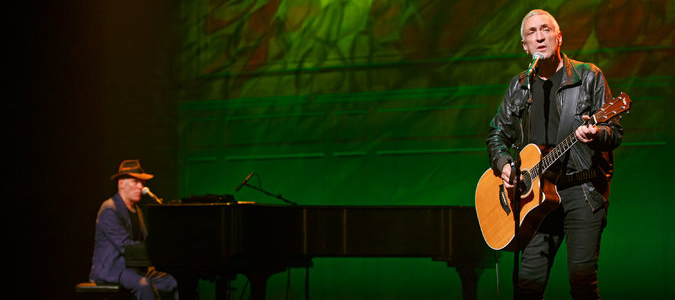

Lennon: Through a Glass Onion
Opening Night: October 15, 2014
Closing: January 11, 2015
Theater: Union Square Theatre
Part concert and part biography, Lennon: Through a Glass Onion reveals the essence of the life and astonishing talent of one of the most admired icons of the past century, told with a story and 31 songs including “Imagine,” “Strawberry Fields Forever,” “Revolution,” “Lucy In the Sky with Diamonds,” “All You Need is Love,” “Come Together,” “Help,” “Working Class Hero,” “Mother,” “Jealous Guy,” and more
BUY TICKETSREAD THE REVIEWS:
October 15, 2014
In the decades since John Lennon’s death, writers, performers, and fans have struggled to untangle the legacy of the most enigmatic Beatle. The latest entry in that canon is Lennon: Through a Glass Onion, a spare two-man production playing at Off Broadway’s Union Square Theater. The stars, John R. Waters and Stewart D’Arrietta, freshly interpret Lennon as a tragic figure, but don’t stray too far from his original aesthetic. Thanks to this skillful treatment, Lennon soars in a way most Beatles reimaginations, like the 2006 Cirque du Soleil show Love or the 2007 film Across the Universe, do not. Through a Glass Onion doesn’t bog itself down with attempts to mimic Lennon’s psychedelic grandiosity. In fact, that’s the show’s most striking dimension. There are no sets, and Anthony Barrett’s excellent light design is modest. Waters and D’Arrietta, who premiered the show 22 years ago in Sydney, Australia, want crowds to focus on them alone. They’ve got the gravity to make that work. The show explores Lennon’s life through 31 of his songs, re-sequencing them and mixing in first-person monologues to stitch together a surprisingly poignant narrative. As D’Arrietta plunks away at a piano and adds vocal harmonies, the 65-year-old Waters strums a guitar and belts out classics ranging from ”You’ve Got to Hide Your Love Away” to ”Working Class Hero.”
READ THE REVIEWOctober 16, 2014
Australian actor John R. Waters, with a strong assist from Stewart D’Arrietta, brings his version of John Lennon’s artistry to Lennon Through A Glass Onion. The show, now at the Union Square Theater, has been a touring mainstay for the two for 20 years. The premise: Lennon as aging rocker ruminating on his past; there’s no through line or chronology. He just muses on fame, religion, revolution and Yoko — alongside 34 of his beloved songs, such as “All You Need Is Love,” “Revolution,” “Nowhere Man” and “Woman.” The effect, however, is more rueful than raging. The real John Lennon, evident in snarky, occasionally hostile interviews, often came across as the quintessential angry young man. Yet, he was also charming, wickedly clever and compelling — and it’s difficult to capture such a potent brew. Waters dons a Liverpool accent, and recreates Lennon (and McCartney) classics, but in a voice more reminiscent of Dylan than the provocative Beatle. Admittedly Lennon is a tough act to follow, which makes Through A Glass Onion, though sincere, hard to pull off.
READ THE REVIEWOctober 15, 2014
The latest entry to hit New York in the popular dead-folks-in-concert genre, Lennon: Through a Glass Onion, joins an already saturated market. In the past decade, New York audiences have experienced John Lennon thrice on Broadway (2005’s Lennon, 2010’s Rain, and 2013’s Let It Be). A trip from the “Imagine” mosaic in Central Park’s Strawberry Fields down to the Union Square Theatre (where Through a Glass Onion is showing) might give you the impression that the beloved former Beatle is the patron saint of this city and its restless artistic spirit — someone whose legacy is to be shared and enjoyed by all people. But make no mistake: A conspicuously placed program note reminds us that “John Lennon” is a trademark of Yoko Ono Lennon. “Imagine no possessions” indeed. With Ono’s blessing, Lennon: Through a Glass Onion is the creation of Australian actor John R. Waters and Stewart D’Arrietta. They’ve been touring the show off and on for over 20 years, ever since they first performed it in a Sydney hotel in 1992. Perhaps this high-concept tribute concert might feel more at home in a hotel bar or similarly intimate space. Sadly, it feels awfully small on this large and empty proscenium stage.
READ THE REVIEWOctober 15, 2014
Except for his convincing Liverpudlian accent, John R. Waters barely looks or sounds anything like the subject of Lennon: Through a Glass Onion. So if you’re expecting a Rain-style re-creation of the former Beatle, you won’t get it at this bare-bones production. Rather, Waters, a 65-year-old Aussie, effectively channels John Lennon’s spirit in his affecting concert-cum-monologue, which comes off best by imagining that Lennon had survived his assassin’s bullets, and is now 74 and performing solo acoustic shows in intimate venues. Waters began performing a version of the show in Sydney 22 years ago, and he’s clearly comfortable in his subject’s skin. Clad in Lennon’s youthful uniform of black leather jacket and black jeans, he performs full or excerpted renditions of 31 songs from Lennon’s solo and Beatles’ catalogs, accompanied by the excellent singer/pianist Stewart D’Arrietta.
READ THE REVIEWOctober 17, 2014
Even after Broadway’s “Beatlemania” and the Fab Faux, it still takes some moxie to tackle a stage portrait of a giant like John Lennon. John R. Waters, in Lennon: Through a Glass Onion, wisely doesn’t attempt a complete impersonation. There are no glasses or beard or mop top here, just an evocative approximation of the voice and a deeply felt reflection of the man. The stage is occupied only by a piano (Stewart D’Arrietta accompanies Mr. Waters) and a mike stand. The gray-haired Mr. Waters, in black pants, T-shirt and leather jacket, steps up and describes the New York winter of 1980 and a guy waiting five hours across the street from the Dakota. The lights go dark, five shots are heard, and Mr. Waters, sometimes accompanying himself on guitar, begins a loose account of the singer’s life in the first person. Well-trod Beatle lore is addressed, including the rivalry with Paul McCartney; the visit to the Maharishi Mahesh Yogi; the breakup; and the resentment of Yoko Ono (“British Anglo-Saxon racism — that’s what it was”).
READ THE REVIEW






















